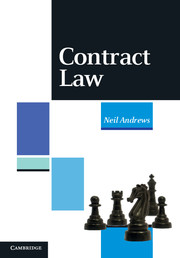Book contents
- Frontmatter
- Contents
- Preface
- Table of cases
- Table of statutes
- Table of statutory instruments
- Part I Introduction
- Part II Formation
- Part III Consideration and intent to create legal relations
- Part IV Third parties and assignment
- Part V Vitiating elements
- Part VI Terms and interpretation
- Part VII Breakdown and liability
- Part VIII Remedies for breach
- Part IX Illegality and public policy
- 20 The illegality doctrine
- Part X The future
- Appendix: A who's who of contract law
- Bibliography
- Index
20 - The illegality doctrine
from Part IX - Illegality and public policy
- Frontmatter
- Contents
- Preface
- Table of cases
- Table of statutes
- Table of statutory instruments
- Part I Introduction
- Part II Formation
- Part III Consideration and intent to create legal relations
- Part IV Third parties and assignment
- Part V Vitiating elements
- Part VI Terms and interpretation
- Part VII Breakdown and liability
- Part VIII Remedies for breach
- Part IX Illegality and public policy
- 20 The illegality doctrine
- Part X The future
- Appendix: A who's who of contract law
- Bibliography
- Index
Summary
INTRODUCTION
Summary of main points
(1) The long-standing illegality doctrine (the defence known as ex turpi causa non actio oritur: 20.03) has been applied to prevent a wrongdoer or wholly unmeritorious party from obtaining relief in the civil law. The courts (with the Law Commission's encouragement) have moved away from a mechanistic approach to this doctrine (for example, Gray v. Thames Trains Ltd (2009) and the Stone & Rolls case (2009)). They now consider whether denial of civil relief will be consistent with the policy underlying the relevant head of illegality or public policy (20.02 to 20.05).
(2) Agreements are illegal, and hence unenforceable, if they involve an undertaking to commit a crime. An agreement is also illegal if the parties jointly and deliberately undertake to commit a legal wrong, such as a tort or breach of trust (20.06).
(3) Prima facie, if statute (a) expressly or (b) by ‘necessary implication’ prohibits a transaction, neither party can enforce it, not even a party who is unaware of the relevant prohibition (Re Mahmoud and Ispahani (1921): 20.07). However, as for (a), a party intended to be protected by the statutory invalidity might be able to sue on the transaction (Nash v. Halifax Building Society (1979): 20.08); and, as for (b), in the absence of an express prohibition, the court will be reluctant to find an implied prohibition of a type of transaction if contractual invalidity within that context will operate harshly on a category of innocent parties (Hughes v. Asset Managers plc (1995): 20.08). Nor will the court find an implied prohibition of a type of transaction if the contract does not directly fall within the scope of the relevant statutory prohibition (St John Shipping Corporation v. Joseph Rank Ltd (1957): 20.09).
[…]
- Type
- Chapter
- Information
- Contract Law , pp. 620 - 646Publisher: Cambridge University PressPrint publication year: 2011



